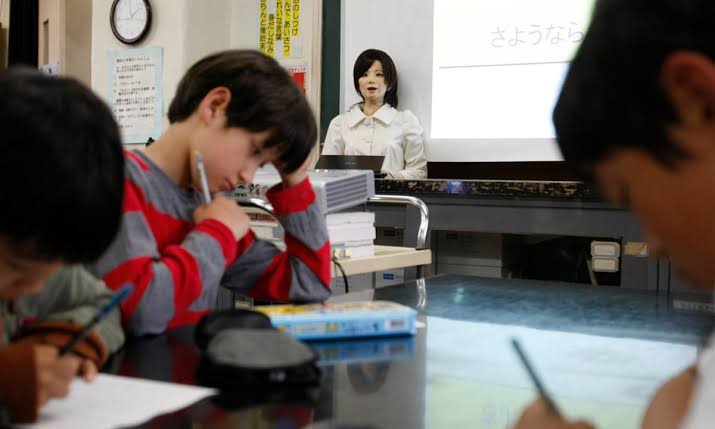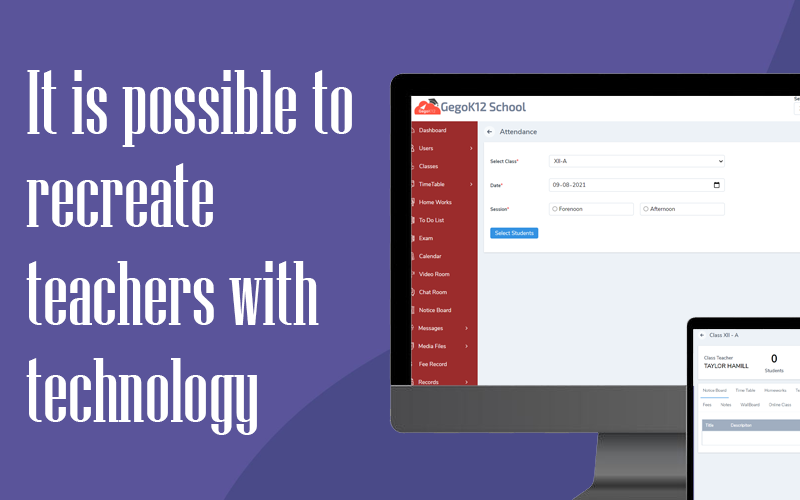This is a very well reality that technology is replacing virtually everything in today’s world. We no longer require paper and pens because software can be used to write on them, and we no require extra physical books due to the introduction of e-books and PDFs.
As a result, the problem emerges: Can modern technology also replace teachers? Is this technology advanced enough to educate youngsters in the same manner that virtual teachers do? Is the need for human educators being phased out?
Everyone wants something different. But, in our perspective, the response to the above-mentioned points is an emphatic “No.” A teacher cannot be replaced by technology. A teacher’s use of technology is only an enrichment. It can assist in the learning process, but it cannot fill the role of a teacher.
Despite technology making it possible to attend school while sitting at home, that education is still offered by a teacher. Even with online classes, we observe that teaching is required, whether through videos, tutorials, Skype meetings, or other means.
Children must still learn how to use computers in order to participate in those online sessions, which are, of course, taught by teachers.
It’s worth noting that a teacher is more than just a knowledge facilitator. A teacher also serves as a guide, mentor, and inspiration to students, a position that no technology can ever fully replace. When it comes to essential skills such as decision-making and goal setting, a student requires the support of a teacher because technology cannot teach these human abilities.
Technology clearly supports students in their teaching and plays an important part in the field of education. However, it appears to lack the capability to replace teachers since technology cannot replace interpersonal contact, and technology cannot teach human skills.
During a crisis, online learning can be a suitable substitute for teaching methods, but it cannot replace the school. Classroom learning is still the primary way of imparting education and knowledge because it allows for the teaching of discipline.
Life skills are taught in the classroom:
Absolutely agree that doing virtual classes is a necessity in the present situation. However, We believe that classroom education will always be favored over virtual classes because students and teenage years learn far more in a school environment. Interactions with teachers and classmates on a daily basis boost their ability to deal with problems and educate children on how to function in society. Furthermore, schools hold competitions and exams that result in the development of abilities that are useful in everyday life.
Each has a place in the world:
Virtual learning and classroom lessons both have their place in the world. Virtual learning is particularly crucial in these pandemic times to ensure that children’s education is not disrupted. Classrooms are crucial because they allow youngsters to sit together and focus on a single topic. They can learn new techniques in this atmosphere, and the teacher has their time and attention. As a result, both types of teaching have a place.
The internet is indeed not available to all of us:
Most schools have turned to online teaching and learning. However, it has the disadvantage that not everyone can benefit from online education. Despite the fact that teachers deliver homework via WhatsApp groups, students struggle because there is no direct communication or engagement with the teacher. The signal may be lost at times, and the class may be missed.
Virtual learning is beneficial, but it is not effective. One of the reasons for this is a lack of preparation. The other issue is that the books were unavailable when the new session began, and students were unable to attend their next lesson because they lacked sufficient materials.
Students’ eyes may be affected by learning:
Although online teaching is a useful tool, it is not for everyone. Another issue is a lack of authorization and poor quality. Furthermore, if children stare at the screen for an extended period of time, the blue screen of these devices can harm their eyes. Another disadvantage is that a teacher cannot observe the students’ body language and ensure their attentiveness.
It is critical to work together:
We don’t have much experience with digital learning in India, but we had little choice because finding an alternative for classroom instruction was urgent. Although the concept of online education is not new, it has become our only choice because to the COVID-19 lockdown. Cloud School ERP Solutions are used to handle digitized classrooms. The need of regular parental feedback cannot be overstated. To guarantee that students’ education is not harmed by the pandemic, teachers, students, and parents must work together.

